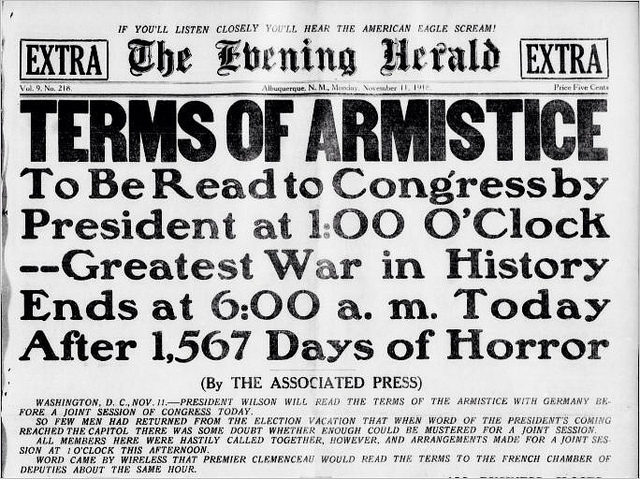
When We Decide to Stop Fighting
One hundred years ago this weekend, after years of horrendous, murderous fighting, the First World War ended.
It was called a war to end all wars. Fighting lasted for more than four years. Developments in the technology of war contributed to millions of people losing their lives. Governments collapsed and maps were redrawn in its wake.
Many people believe the primary causes of the Second World War can be traced to how the First World War ended.
The loss of life and environmental devastation were overwhelming. The years of conflict changed some of the basic economic truths of the world.
Even the countries which were understood to prevail in the fighting were exhausted by the war.
Some of us approach life, including spiritual life, the same way those countries did over a hundred years ago. Once we become convinced of a goal we are willing to pour our resources, our lives, into achieving it.
We can be tenacious and persistent, maybe even relentless. Almost nothing can make us decide to stop fighting once we have chosen our reasons.
Anyone who disagrees with us, who wants us to stop or change, becomes a target in our path. We approach life like a contest, or a war, and we do not want to lose.
Our lives may be just as exhausting as those nations found the war. Do we know when to decide to stop fighting?
We may feel responsible to carry on our fight until it is impossible for us to continue. Some of us see ourselves as being the last person standing, the ultimate hope of whatever cause we advocate.
It is difficult to even imagine what it would be like for us to decide to stop fighting.
How Do We Decide to Stop Fighting?
When we live our lives like a competition it can be challenging to even consider the possibility we might stop fighting. Our fighting becomes our way of life, who we are, how we live. It becomes hard to see any other way to live.
Many of us have been encouraged to stand up for ourselves for as long as we can remember. Our own parents may have told us we cannot let other people push us around or tell us what to do.
We may perceive life as a fight to make sure we and the people we love get what we deserve, our fair share.
I believe there are people from whom we need to protect ourselves and those we love. We experience things which certainly do not seem to be fair or just at the time.
The difficulty I have with a fighting stance toward life is where I think it comes from. In my experience the people who fight the hardest are often frustrated and angry, afraid and insecure.
It is exhausting to fight all the time. When we practice fighting as a way of life it only strengthens our ability to fight. We focus our resources, internal and external, on fighting life. The one thing we develop is our fighting skills.
When we approach life with a fighting stance we can begin to see every moment as a potential fight. Each person we meet, each interaction becomes an opportunity to demonstrate our fight skills.
Some of us get to a point where we decide to stop fighting on our own. That is not the kind of person we want to be.
Others of us may be convinced it is time to decide to stop fighting by how other people respond to us.
What Do We Practice When We Decide to Stop Fighting?
When we decide to stop fighting we look for ways to put our decision into practice.
Some of us begin to explore approaches to life which are not based in fighting. We may read about or research nonviolence or cooperation or other alternatives to fighting.
It can be helpful for us to begin other practices which support or reinforce our new way of living. There are people who learn about contemplative practices which help them stop fighting. Some of us begin physical practices like yoga or tai chi to remind us to relax as we stop fighting.
Other people find it important to find a person or group of people with whom they can share. A mentor or guide or soul friend can often help us see ourselves more clearly.
Some people explore ways to give themselves time to reflect on new, less competitive ways to approach life.
There may be people who do not believe us when we decide to stop fighting. They might ask us questions or try to test the strength of our resolve. The ways we practice preparing for these conversations help us think through our new decision.
Why Do We Decide to Stop Fighting?
Each of us who approaches life as a competition has our own reasons to decide to stop fighting. We may have lost a significant friendship or a good job or a relationship with someone we loved. Some of us are exhausted, like the countries fighting a hundred years ago.
I believe many of our own personal reasons boil down to the fact we do not want to be like this anymore.
When we decide to stop fighting it is because we make a decision. Whether we have been trying to decide for a long time or not, this is not how we want to live our lives.
We may be tired or frustrated, or tired of being frustrated. This practice of fighting with life does not work for us.
Like the countries in a war to end all wars a hundred years ago, we can decide to stop fighting. When we decide to stop fighting it might encourage someone else to stop fighting, too.
We decide to stop fighting one moment, one person at a time.
When will we decide to stop fighting today?
Who will help us decide to stop fighting and put it into practice this week?
[Image by JSF539]
Greg Richardson is a spiritual life mentor and coach in Southern California. He is a recovering attorney and university professor, and a lay Oblate with New Camaldoli Hermitage near Big Sur, California. Greg’s website is StrategicMonk.com, and his email address is [email protected].












